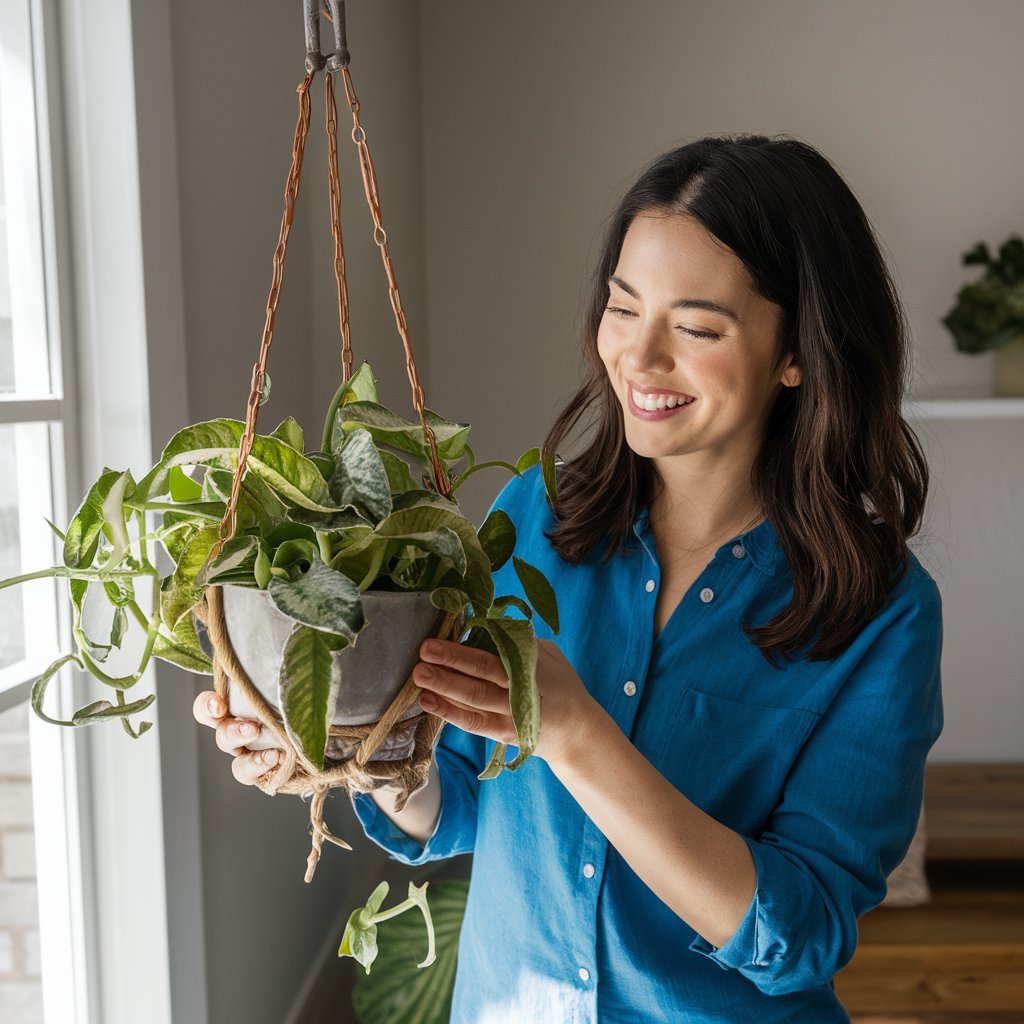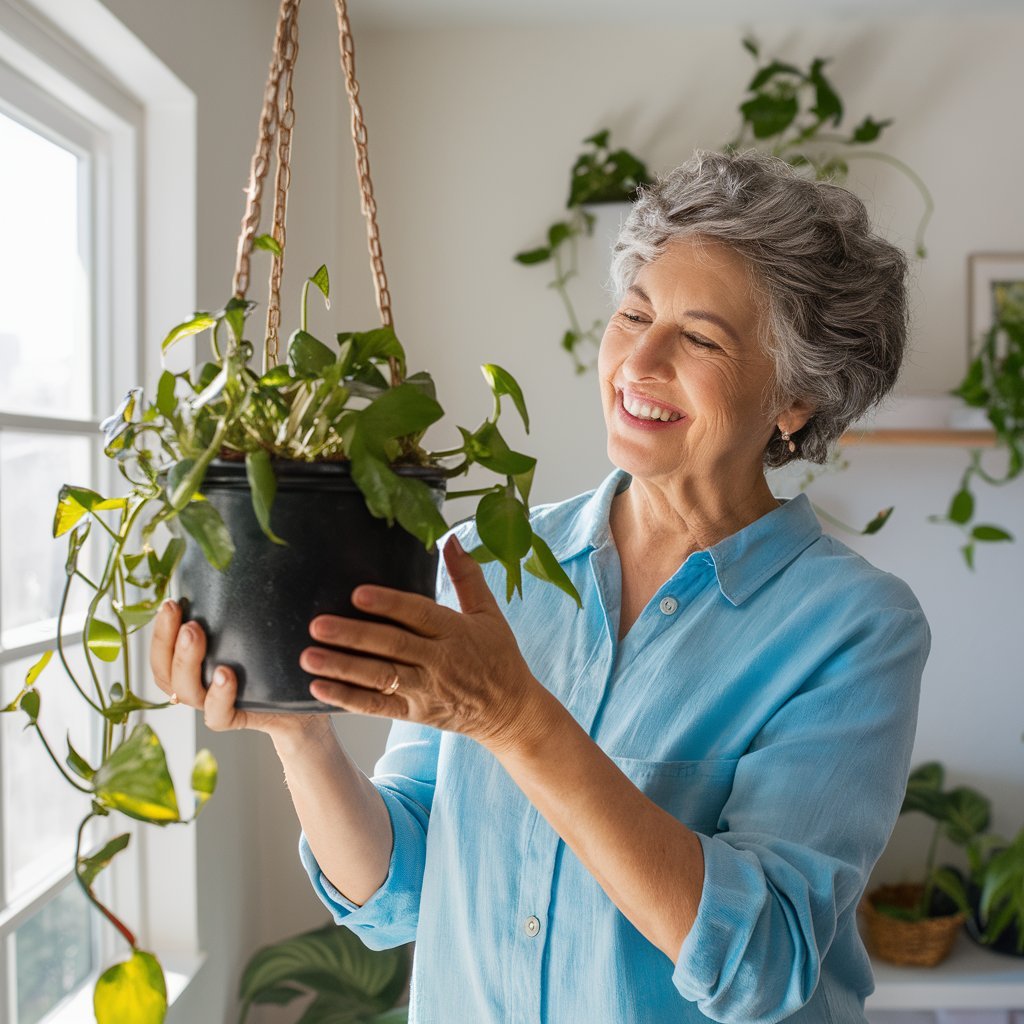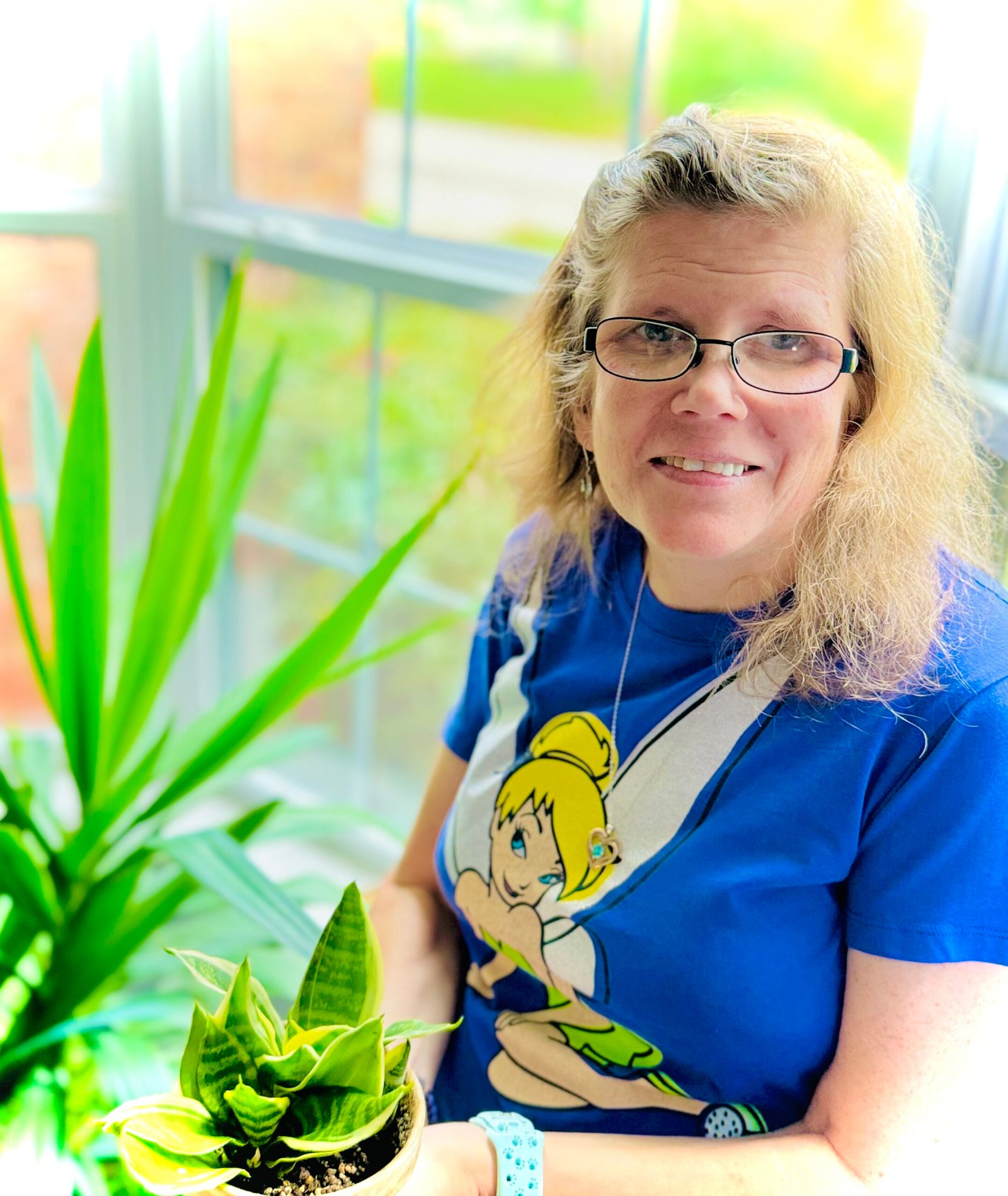Understanding Plant Therapy
Indoor plants can be a game-changer for mental wellness, especially for city dwellers with limited outdoor space. Let’s chat about how these green buddies can boost your mood and overall well-being.
Benefits of Indoor Plants
Indoor plants aren’t just pretty faces; they bring a bunch of perks to the table. Here’s why you might want to add some greenery to your home:
- Cleaner Air: Plants act like natural air filters, soaking up toxins, pumping out oxygen, and upping the humidity. This means you breathe easier and feel better.
- Home Makeover: Greenery can turn a dull room into a cozy, inviting space. Think of plants as living decor that adds a splash of life to your home.
- Stress Buster: Taking care of plants—watering, pruning, and just watching them grow—can be super relaxing. It’s like a mini-meditation session.
- Mood Booster: Just being around plants can lift your spirits. This is called biophilia, and it’s a real thing.
| Benefit | What It Does |
|---|---|
| Cleaner Air | Absorbs toxins, releases oxygen, ups humidity |
| Home Makeover | Adds beauty, makes spaces inviting |
| Stress Buster | Relaxing activities, promotes calm |
| Mood Booster | Triggers happy vibes, biophilia effect |
Impact on Mental Wellness
Indoor plants do more than just look good—they can seriously improve your mental health. Here’s how:
- Less Anxiety: Plants like lavender can help you chill out. The scent of lavender is known to create a peaceful vibe (Thrive).
- Better Memory and Focus: Rosemary isn’t just for cooking. Its essential oil can boost your memory and help you focus by lowering stress hormones (Thrive).
- Long-Term Benefits: Moving to greener areas can improve your mental health for years. A study from the University of Exeter found that people who moved to greener spaces felt better for at least three years (Thrive).
- The “Plant Effect”: During the COVID-19 pandemic, having indoor plants helped people feel less stressed (NCBI).
| Mental Wellness Impact | What It Does |
|---|---|
| Less Anxiety | Lavender scent calms you down |
| Better Memory and Focus | Rosemary oil boosts memory, lowers stress |
| Long-Term Benefits | Greener areas improve mental health for years |
| The “Plant Effect” | Indoor plants reduce stress |
By getting to know the benefits of indoor plants and their impact on mental wellness, you can create your own little green haven for stress relief. For more tips on boosting your mental wellness with suspended gardens, check out our guide.

Want more ideas on how to use hanging plants for mental health? Look at 10 powerful ways hanging plant therapy can transform your mental health and create your own stress-free oasis with indoor forests.
Stress Relief with Indoor Gardens
The Magic of Greenery
Having plants around your home isn’t just about aesthetics; it’s a game-changer for your mental well-being. Whenever I surround myself with plants, I feel my stress melt away. This “plant effect” has been a lifesaver, especially during tough times like the COVID-19 pandemic.
Take lavender, for example. Its calming scent can turn a chaotic day into a peaceful evening. Rosemary is another hero, boosting memory and easing anxiety while lowering cortisol, the stress hormone (Thrive).
Studies back this up, showing that interacting with plants can actually calm your nervous system. So, if you haven’t started your own hanging garden yet, now’s the time!
Physical Perks of Plant Care
Caring for plants isn’t just good for your mind; it’s a boon for your body too. Whenever I tend to my plants, I notice my heart rate and blood pressure drop. This calming effect is linked to the way plants interact with our nervous system.
Plus, taking care of plants is a sneaky way to get some exercise. Whether I’m watering, pruning, or just admiring my hanging garden, these activities keep me moving and engaged.
| Plant Type | Psychological Benefits | Physical Benefits |
|---|---|---|
| Lavender | Reduces anxiety, promotes calm | N/A |
| Rosemary | Relieves anxiety, boosts memory | Lowers cortisol levels |
| General Greenery | Reduces perceived stress | Lowers heart rate and blood pressure |
Spending time with plants also gives me a sense of purpose and routine. This is especially helpful for busy folks or those working from home, offering a natural break to reset and recharge.
For more tips on making plants a part of your daily life, check out our article on cultivate calm: 7 daily plant routines to revolutionize your mental health. And if you’re ready to start your own hanging garden, our guide on boost your mental wellness: the ultimate guide to creating suspended gardens is a great place to begin.
By adding greenery to your home, you can enjoy the dual benefits of mental peace and physical well-being. So why not give it a shot and turn your home into a serene sanctuary?
Creating Aerial Sanctuaries
Setting up hanging gardens at home can be a game-changer, offering both visual delight and mental wellness perks. Let’s get into the nitty-gritty of setting up your hanging gardens and picking the right plants for top-notch care.
Setting Up Suspended Gardens
Creating hanging gardens involves a few simple steps to help you build a stress-busting, eye-catching space.
Pick Your Spot: Find places in your home where you can hang plants. Great spots include near windows, in living rooms, bedrooms, or even above your desk to boost productivity and creativity.
Choose Your Hanging Gear: There are several ways to hang plants, like:
- Hooks and Ceiling Mounts: Perfect for heavier plants.
- Wall Brackets: Great for adding greenery without using floor space.
- Macramé Hangers: Adds a stylish touch while keeping your plants secure.
- Get Your Supplies:
- Pots and Planters: Make sure they have drainage holes to avoid waterlogging.
- Soil: Pick soil that matches your plants’ needs.
- Watering Tools: A watering can with a long spout is handy for reaching high-up plants.
- Install and Arrange: Secure your hanging mechanisms and arrange your plants so they get enough light and air.
Plant Selection and Care
Choosing the right plants for your hanging garden is key to keeping them healthy and making your stress-relief haven effective.

Best Plants for Hanging Gardens
| Plant Name | Light Needs | Watering Needs | Special Care |
|---|---|---|---|
| Spider Plant | Bright, indirect light | Moderate | Trim offshoots to boost growth |
| Pothos | Low to bright, indirect light | Low | Let soil dry out between waterings |
| Boston Fern | Bright, indirect light | High | Keep soil moist, mist often |
| String of Pearls | Bright light | Low | Use well-draining soil |
General Plant Care Tips
Light: Make sure your plants get the right amount of light. Most hanging plants love bright, indirect light. Adjust their placement based on each plant’s needs.
Watering: Overwatering is a common problem with hanging plants. Use pots with drainage holes and let the soil dry out between waterings.
Humidity: Some plants, like ferns, need higher humidity. Mist these plants regularly or use a humidifier nearby.
Pruning and Maintenance: Regularly check for dead leaves and prune to encourage healthy growth. This can also help reduce mental fatigue and negative emotions (Washington Post).
By adding these elements to your home, you can create a calm and stress-free environment. For more tips, check out our article on boost your mental wellness: the ultimate guide to creating suspended gardens.
Embracing the healing power of plants can really improve your living space and mental health. Whether you live in the city, have a busy job, or practice mindfulness, hanging gardens offer a unique way to bring nature into your daily life. Learn more about the benefits of plant therapy by exploring 10 powerful ways hanging plant therapy can transform your mental health.
Sprucing Up Your Space
Plants with a Purpose
City living often means tiny balconies or no outdoor space at all, but that doesn’t mean you can’t bring a bit of nature indoors. Hanging plants are a great way to add some green to your home while also boosting your mood.
When picking plants for your hanging garden, think about how they look and how they make you feel. Lavender, for instance, is great for reducing anxiety. Its sweet smell can help you relax. Rosemary isn’t just for cooking; its essential oil can improve memory, ease anxiety, and lower stress.
Mixing different plants can make your space look more interesting and can also boost the overall good vibes. Here’s a quick list of some plants and what they can do for you:
| Plant | Benefit |
|---|---|
| Lavender | Reduces anxiety, promotes calm atmosphere |
| Rosemary | Improves memory function, relieves anxiety, lowers cortisol levels |
| Spider Plant | Known for its air-purifying properties |
| Pothos | Easy to care for, excellent at removing indoor pollutants |
| Boston Fern | Adds humidity, helps to improve air quality |
Want to know more about how hanging plants can help your mental health? Check out our article on 10 powerful ways hanging plant therapy can transform your mental health.
Bringing Nature into Your Daily Life
Adding hanging gardens to your daily routine can really brighten up your home. Greenery can make you feel happier, much like spending time with pets. This love for nature, called biophilia, is good for your brain.
Put your hanging plants where you spend the most time, like near your desk, in the living room, or even in your bedroom. Being around plants can lower your stress levels (Texas A&M Today).
Here are some easy ways to fit plants into your daily life:
- Morning Routine: Start your day by watering your plants. It’s a simple, mindful activity that can set a positive tone for the day.
- Work Breaks: Take short breaks to water or mist your plants. It’s a refreshing way to reset and reduce stress.
- Evening Relaxation: Spend a few minutes in the evening in your plant corner, enjoying the calming scents of lavender or rosemary.
For more tips on creating a peaceful indoor garden, check out our article on boost your mental wellness: the ultimate guide to creating suspended gardens.
By adding hanging plants to your home, you can create a calm oasis that looks great and helps you feel better. For more tips on keeping a peaceful environment with plants, read our guide on cultivate calm: 7 daily plant routines to revolutionize your mental health.

My name is Michelle Warren, and I’m the founder of Peaceful Gardening. As a 10-year breast cancer survivor, I’ve discovered the profound therapeutic power of gardening. This journey has not only helped me recover but has also become my passion and a source of ongoing peace and joy.
Peaceful Gardening was born from my desire to share the healing benefits of gardening with others. Whether you’re facing health challenges, dealing with stress, or simply looking to connect more deeply with nature, this space is for you.
Over the past decade, I’ve cultivated not just plants, but a deep understanding of how gardening can positively impact mental health. I’ve worked with local community gardens, led workshops on mindful gardening practices, and collaborated with mental health professionals to develop gardening-based stress reduction programs.
Peaceful Gardening was born from my desire to share the healing benefits of gardening with others. Whether you’re facing health challenges, dealing with stress, or simply looking to connect more deeply with nature, this space is for you.
Here, you’ll find evidence-based advice on using gardening as a tool for mindfulness, stress relief, and emotional healing. I share personal stories, practical tips, and scientifically-backed information on how to create your own therapeutic garden space, no matter the size of your yard or balcony.
My mission is to help you discover the joy, peace, and healing that comes from nurturing plants and connecting with nature. Join me in exploring how the simple act of tending to a garden can transform your mental and emotional wellbeing.
Welcome to Peaceful Gardening – let’s grow together towards better mental health!”

